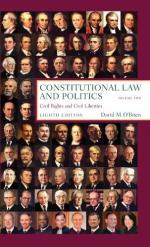|
This section contains 1,376 words (approx. 5 pages at 300 words per page) |

|
For civil liberties, the era after World War II has been full of paradoxes: The victories of the civil rights movement (due in part to the success of non-violent civil disobedience), the expansion of criminal due process, and the judicial establishment of reproductive rights have contrasted with repeated exertions of government power in the name of national security, often cloaked in secrecy and frequently directed at peaceful political activity. Since 1945, the tensions between civil liberties and national security have centered around three conflicts: the Cold War, the Vietnam War, and the war on terrorism.
The Cold War
The apparatus secretly created by Franklin Roosevelt before World War II to collect domestic intelligence about "subversive activities" did not fade away with the end of the war. It shifted its attention to the Communist threat, taking on aspects of hysteria. By executive order, in...
|
This section contains 1,376 words (approx. 5 pages at 300 words per page) |

|


